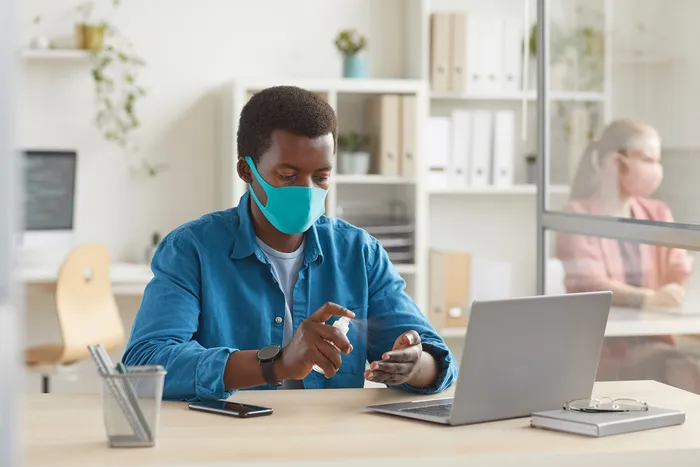Protecting staff and customers as SA continues to battle the third wave

Portrait of young African-American man wearing mask sanitizing hands while sitting at desk in cubicle at post pandemic office, copy space The continued presence of the virus will challenge businesses as they grapple with how to keep employees safe and productive, says the writer. Photo supplied
Annette Devenish
AMID the looting, unrest and extensive destruction of property that has taken place in certain areas of South Africa recently, it’s easy to forget that South Africa remains in the grips of the third wave of Covid-19 infections, with a high rate of hospital admissions, particularly in Gauteng.
Although the roll-out of the Covid-19 vaccination programme is encouraging, and that vaccines help to prevent hospitalisations and severe disease in most people, they may not necessarily rid the world of the virus. Although a Middle Eastern state has fully vaccinated about 60% of its population of more than nine million people, the country was put back on alert in June as the number of infections once again rose with the Delta variant making its presence felt.
Health experts had previously predicted that so-called “herd immunity” to Covid-19 would be reached once vaccination rates were more than 60%. However, there is a growing realisation that the virus may continue to be part of our lives for some time to come, never truly going away, even once 60% or more of people are vaccinated.
The reality, therefore, is that we may have to reconcile ourselves with living with Covid-19 for some time to come. That means that irrespective of whether or not we’ve been fully vaccinated, we will need to keep adhering to the recommended safety protocols, including wearing masks when in public, maintaining social distance from others, and regularly washing our hands with soap or water, or sanitising hands and surfaces when soap and water are not available.
The continued presence of the virus will challenge businesses as they grapple with how to keep employees safe and productive. Purchases of reputable and safe sanitisers for the use of both customers and employees in order to ensure their health and safety will become a regular budgetary item. The challenge, however, is to avoid the many fly-by-night — and sometimes even unsafe — sanitising products that have started to appear in the market in the past 18 months.
Less scrupulous manufacturers have not always followed stringent protocols around compliance and quality standards. In fact, the rush for hand sanitisers in the early days of the pandemic and country-wide shortages resulted in a number of questionable sanitiser suppliers emerge, many of which made false claims about their ingredients, included inadequate quantities of alcohol and even added harmful ingredients to their so-called “sanitisers”. Many of the new pre-saturated wipe and sanitiser suppliers have even added fraudulent certification marks to their product packaging.
For business owners doing their best to protect their staff and customers, it will be important to ensure that they are not associated with substandard sanitisers from unscrupulous manufacturers. To avoid these potentially unsafe products, check the labelling requirements, alcohol content and certifications. Avoid unknown brand names and rather insist on trusted brands from reputable manufacturers. In these uncertain times, it’s not worth risking the health of employees or customers for substandard products that provide inadequate protection.
Annette Devenish is the marketing director at Infection Protection Products.
* The views expressed here are not necessarily those of IOL or of title sites.
BUSINESS REPORT ONLINE
Related Topics: